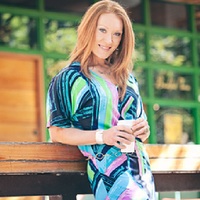Lately, it seems I can’t open up my news feed without an article coming through that heralds a woman naked, un-photoshopped and shaming the media for portraying women in an unrealistic light.
At first I loved this.
I was on board as a recovering body-hater and woman’s empowerment coach. But then I had a sinking feeling that this debate is still missing the point and even worse might be contributing to the problem.
I learned how to hate my body at the ripe old age of five. I was in the back seat of my mother’s car as she was carpooling me and three other girls home from pre-school. I was looking at my thighs next to the other little girls’ thighs wondering—why are mine so much bigger? I was not over-weight.
I just didn’t like being bigger than the other little girls.
I grew up the “bigger boned girl” all the while I day dreamed of being tall, thin and wispy. I wanted to be delicate, gossamer—like Darryl Hannah in Splash. I worked out for years with that end in mind but my body rebelled. I was built like a brick-shit house—not a run-way model.
Then some years later, in partial acceptance of my muscular frame I began to idolize the chiseled-in-stone-roman-warrior look. This fanciful ideal gave me free reign to hate myself into being fit. I chased the perfect body, entered a bodybuilding competition, and woke up the morning of my competition at seven percent body fat thinking I still hated my body. What was I looking for?
I was looking for what every woman is looking for: radical self acceptance, self-love and the need to be deeply valued. But I was looking outside of myself. I was looking to external validation instead of wholly and completely loving myself from inside out.
Body loathing is an issue across the board: 95 percent of women will have at least one hateful body thought a day. Here is the thing, the body-image and body-hate phenomenon is not about our bodies. It’s not about the media either. It’s about how we value ourselves as women, and then in turn how society values us collectively.
The problem with putting our bodies on display for public discourse is that it still keeps us stuck in a positive feedback loop that uses our bodies as the object, as the focal point to be evaluated.
I understand the desire to prove to the media that they have done a poor job of portraying real women but I am sure they know that and they don’t care. Shiny, fancy, pretty things still sell.
I understand the desire to show the world that we can be beautiful and healthy regardless of body type, but are spreads of half naked women and grand public displays of our nakedness teaching the world that we are anything more than objects—than our bodies?
This conversation is important and I honor the women who have gone before me, but focusing the narrative around our body shape is setting ourselves up to be objectified further. As long as we are defining our courage and audacity by the ability to get on stage half naked in front of thousands of people, or posing scantily clad in over sexualized magazine shoots—we are still saying define ‘me’ by body.
In spite of all the progress we’ve made as women over the last 50 years we are still too often objectified by society and by ourselves. We are associating the approval of our bodies, or lack there of, with love, acceptance, success, validation and connection. At a very early age we learn that if we act, behave, achieve, or look a certain way then we will be safe, loved and secure. It’s an obsolete survival mechanism.
It has set us up to look for love in all the wrong places.
As a result we are disconnected from our true Self and ultimately self-love.
Unfortunately, most of us weren’t taught how to love and nurture ourselves. Realizing the fact that we are whole complete beings just the way we are has nothing to do with our bodies or what someone else says about us. It’s a process that happens from the inside out when we heal all the subconscious beliefs that say we aren’t good enough. Then we can learn to nurture, accept, trust and integrate all aspects of our divine feminine being, having more self-compassion and self-acceptance. Reconnecting to self-love is what ultimately will release us from the bond of body hate, image comparison and self objectification.
Why don’t we start teaching our daughters at an early age about self-acceptance and the beauty of uniqueness without always using our looks as the barometer? Then maybe she will be able to turn on the TV, or flip through a magazine and instead of seeing a reflection of what she is not, she will see the rainbow of feminine beauty she is part of.
Why don’t we work on the paradigms that have us believe our wholeness comes from outside of us which separates us from Love, Source and abundance? Then maybe we can see that our bodies are the vehicle for our value not the source of our value.
Why don’t we stop pointing fingers and treating this issue as if it’s someone else’s fault? Instead, we could take back our power by taking the responsibility to heal the false beliefs that set us up to objectify our bodies.
Then maybe slowly our collective feminine pain will heal regardless of societies priorities.
There is nothing wrong with wanting to feel pretty and feel beautiful. There is nothing wrong with talking about the spectrum of female beauty, but it only takes a few of us to stand up and say this isn’t about our bodies.
Love elephant and want to go steady?
Sign up for our (curated) daily and weekly newsletters!
Editor: Renée Picard
Photo: Christi Nielsen Flickr


 Share on bsky
Share on bsky





Read 5 comments and reply